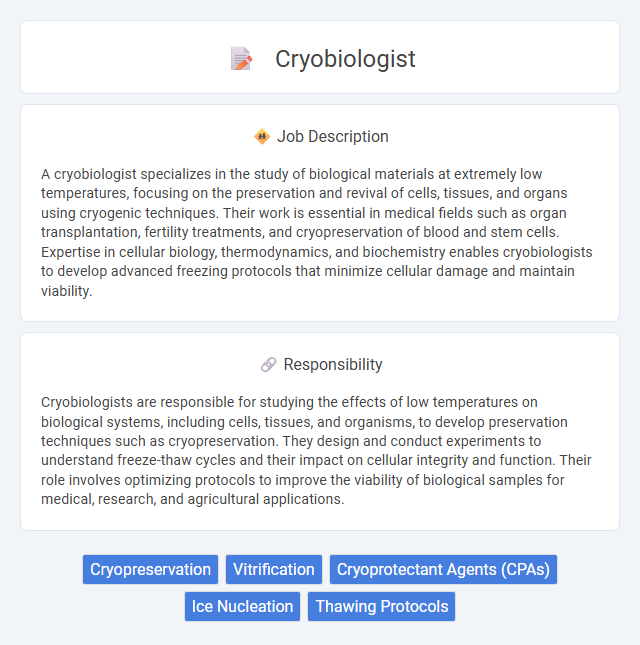
A cryobiologist specializes in the study of biological materials at extremely low temperatures, focusing on the preservation and revival of cells, tissues, and organs using cryogenic techniques. Their work is essential in medical fields such as organ transplantation, fertility treatments, and cryopreservation of blood and stem cells. Expertise in cellular biology, thermodynamics, and biochemistry enables cryobiologists to develop advanced freezing protocols that minimize cellular damage and maintain viability.
Individuals with a strong passion for biology and a meticulous attention to detail are likely to thrive as cryobiologists. Those comfortable working in laboratory environments under controlled conditions and with complex scientific equipment may find this career suitable. People who prefer repetitive tasks without much variability might struggle in this dynamic field that often requires problem-solving and adaptation to new research findings.
Qualification
A cryobiologist must hold at least a bachelor's degree in biology, biochemistry, or a related field, with many employers requiring a master's or doctoral degree specializing in cryopreservation techniques. Comprehensive knowledge of cell biology, molecular biology, and thermodynamics is essential for understanding the effects of low temperatures on biological systems. Practical experience with laboratory equipment, cryogenic storage methods, and data analysis software enhances their ability to conduct experiments and develop new preservation technologies.
Responsibility
Cryobiologists are responsible for studying the effects of low temperatures on biological systems, including cells, tissues, and organisms, to develop preservation techniques such as cryopreservation. They design and conduct experiments to understand freeze-thaw cycles and their impact on cellular integrity and function. Their role involves optimizing protocols to improve the viability of biological samples for medical, research, and agricultural applications.
Benefit
A career as a cryobiologist likely offers the benefit of contributing to groundbreaking advancements in medical preservation techniques, potentially extending the viability of organs and tissues for transplantation. It may provide opportunities to work in innovative research environments with cutting-edge technology, enhancing job satisfaction and career growth. The role could also offer competitive salaries and the chance to impact public health positively through the development of life-saving cryopreservation methods.
Challenge
Working as a cryobiologist likely involves navigating complex challenges related to maintaining the viability of biological samples at extremely low temperatures. The unpredictable behavior of cells and tissues during freezing and thawing processes may pose significant obstacles that require innovative problem-solving skills. Success in this field probably depends on a deep understanding of cryopreservation techniques and the ability to optimize protocols for diverse biological materials.
Career Advancement
Cryobiologists specializing in the preservation of biological samples can advance their careers by gaining expertise in cryopreservation techniques and regenerative medicine. Progression opportunities often include leading research teams, securing grants for innovative projects, and collaborating with pharmaceutical or biotechnology companies. Continuous education and publication in scientific journals enhance reputation and foster career growth in academic or industry settings.
Key Terms
Cryopreservation
Cryobiologists specialize in the science of cryopreservation, which involves preserving cells, tissues, and organs at ultra-low temperatures to maintain their viability for future use. They utilize advanced freezing techniques such as vitrification and controlled-rate cooling to prevent ice crystal formation that can cause cellular damage. This expertise supports vital applications in medicine, reproductive technology, and biological research, ensuring the long-term storage of biological samples with minimal degradation.
Vitrification
Cryobiologists specializing in vitrification develop and optimize rapid freezing techniques to prevent ice crystal formation in biological samples, preserving cellular integrity during long-term storage. They conduct research on cryoprotectants and cooling rates to enhance survival rates of tissues, embryos, and organs. Expertise in vitrification advances applications in reproductive medicine, organ transplantation, and regenerative biology.
Cryoprotectant Agents (CPAs)
Cryobiologists specialize in the study and application of Cryoprotectant Agents (CPAs) to protect biological tissues and cells from damage caused by freezing and thawing processes. CPAs such as glycerol, dimethyl sulfoxide (DMSO), and ethylene glycol play a crucial role in inhibiting ice crystal formation, thereby preserving cellular integrity in cryopreservation. Mastery of CPA concentration, toxicity reduction, and permeation dynamics is essential for optimizing cryopreservation protocols in medical, agricultural, and reproductive biotechnologies.
Ice Nucleation
Cryobiologists specialize in understanding ice nucleation processes to improve the preservation of biological samples at low temperatures. They analyze the formation and growth of ice crystals within cells to develop techniques that minimize cellular damage during freezing and thawing. Expertise in ice nucleation directly supports advancements in cryopreservation, organ transplantation, and cryosurgery.
Thawing Protocols
Cryobiologists develop precise thawing protocols critical for preserving the viability of biological samples such as cells, tissues, and organs after cryopreservation. These protocols involve controlled temperature increases to prevent ice crystal formation and cellular damage, ensuring optimal recovery and functionality. Mastery in thawing techniques directly impacts success rates in cryobiology applications like fertility treatments, transplantation, and biobanking.
 kuljobs.com
kuljobs.com